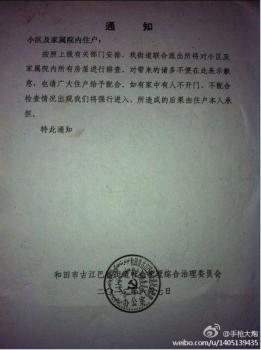Notice informs locals of mandatory residence searches in Hotan community; police reserve the right to “use force” to enter homes

For immediate release
June 18, 2012, 4:00 pm EST
Contact: Uyghur American Association +1 (202) 478 1920
An official notice posted on June 7, 2012 in the Gujanbagh [Chinese: Gujiangbage] neighborhood of the predominantly Uyghur city of Hotan, located in the southern part of East Turkestan, informs locals that police will undertake a search of every residence in the neighborhood, at the behest of higher-level authorities. According to the notice, if residents do not open the door upon the arrival of police, they will use force to enter, and any consequences thereof will be borne by the residents themselves. The Uyghur American Association (UAA) believes the police searches are being implemented in order to systematically intimidate the Uyghur population in Hotan, which, according to recent reports received by UAA, remains the only municipality in the region to maintain a majority Uyghur presence in the core of the city.
The searches in Hotan are consistent with recent examples of the use of force to crack down on peaceful Uyghur activities deemed outside of state control. UAA fears Chinese authorities will use the searches as justification to arbitrarily detain Uyghurs who have not engaged in any type of criminal activity. Additionally, based on the Chinese government’s documented record of cracking down on “illegal gatherings” of Uyghurs, UAA believes Chinese officials are likely to use house-to-house searches as a pretext for suppressing any gathering, however peaceful, that is viewed as contrary to Communist Party doctrine.
The neighborhood to be searched is located in the vicinity of the Regional Office of the Hotan Central Party Committee, next-door to the location of a police raid that took place on June 6. The raid on a religious school in Hotan resulted in the injury of 12 Uyghur children, several staff members and three police officers. The raid took place as Chinese authorities stepped up a campaign on underground religious schools in East Turkestan, and as Chinese police have heightened the security presence in the region due to the upcoming third anniversary of turbulent unrest in the regional capital of Urumchi. Chinese officials place tight restrictions on Uyghurs’ religious practices, including a ban on religious instruction for minors, meaning that any school teaching religion to children is viewed by authorities as “illegal”.
The search of all homes in Gujanbagh would require a massive and highly-organized police force that would brook no protest. According to information posted in March 2012 on a Chinese government website, there are 10,527 homes in the Gujanbagh neighborhood, and a total of 25,663 residents. The same website extols the “reform” of Hotan’s Uyghur Old City, which is being demolished in much the same way as the traditional Uyghur Old City of Kashgar.
Article 17 of the International Covenant of Civil and Political Rights (ICCPR), which has been signed but not ratified by China, states: “No one shall be subjected to arbitrary or unlawful interference with his privacy, family, home and correspondence, nor to unlawful attacks on his honour and reputation.” Additionally, the ICCPR guarantees the right to the protection of the law against such interference or attacks.
Under China’s Criminal Procedure Law, police are authorized to search the body and personal belongings of a criminal suspect. However, Article 111 of the CPL states:
“When conducting a search, a search warrant must be produced to the person to be searched. In making an arrest or detention under emergency, a search may be carried out without a search warrant.”
Chinese officials have a history of conducting house-to-house searches in Hotan and other cities in East Turkestan as part of intensive security clampdowns. Heightened campaigns to promote security and battle alleged separatism in East Turkestan have frequently corresponded with increased drives to dilute Uyghur culture and assimilate Uyghurs. In the days, weeks and months following the July 2009 unrest in Urumchi, Uyghurs living in Urumchi and other locations in East Turkestan were subjected to widespread arbitrary detention and “forcible disappearances” after house-to-house searches and other security sweeps. A report issued by Human Rights Watch in October 2009 documented large-scale sweep operations conducted by security forces in two predominantly Uyghur areas of Urumchi beginning July 6, during which young Uyghur men were packed into trucks and jeeps by the dozens.
In April 2009, reports from Hotan and Kashgar indicated that police and security forces were engaged in the abuse of power to carry out the arbitrary detention, beatings and other forms of repression of Uyghur residents. At the time, local government authorities reportedly closed unregistered Islamic schools and conducted house-to-house searches beginning in February 2009. Local residents reported that armed police conducted house-to-house searches at night, and beat those who refuse to cooperate. At least seven religious schools were closed down, and 39 individuals arrested. Uyghurs also reported the presence of hidden cameras and plain-clothes police in some local mosques.
